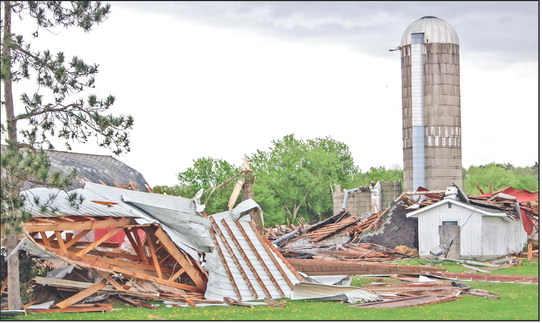Manure digester proposal given to county
By Kevin O’Brien
A multinational company interested in building a manure digester in Marathon County would like to know by the end of the year if county supervisors are willing to sign off on $45 million in tax-exempt financing for a project that promises to create 10 new jobs and transform animal waste into renewable energy.
Macquaire Capital, based in Sydney, Australia, is behind a proposal to construct an anaerobic digester on land owned by Van Der Geest Dairy, which will sell cow manure to the company for methane extraction.
At the county board’s Oct. 24 meeting, a trio of guest speakers presented information to the board about the proposed project and answered questions from supervisors. WI RNG VDG, a limited-liability corporation pitching the project, originally wanted the board to vote last week on an initial resolution tentatively approving a $45 million bond, but after supervisors raised questions, an informational presentation was arranged instead.
Nick Cioll and Ralph McGinley spoke on behalf of Progressive Energy, a Louisianabased energy firm that assists Macquaire Capital in developing energy projects. Also present was attorney Lynda Templen, who is serving as bond counsel for the company.
As a conduit borrower, the county would not be responsible for making any debt payments, and the $14 million in bonds would not affect the county’s credit rating or count against its debt limit. The developer would save money by utilizing the county’s ability to issue tax-free bonds.
Cioll said Macquarie Capital will provide 30 percent of the funding for the project, with the remaining 70 percent to be borrowed. Macquarie is one of the nation’s leading wholesalers of natural gas, he said, See METHANE GAS/ page 15 Methane gas
Continued from page 1
and it considers the Van Der Geest proposal a potentially lucrative project.
Cow manure is one of the best sources of renewable natural gas because the conversion process has the added benefit of removing greenhouse gas from the environment, he said.
“Methane is about 40 times more potent than CO2 per metric ton, so when you have a dairy farm and you put all that manure in those pits, all of that methane just goes right up into the atmosphere,” he said.
The natural gas produced by the digester – estimated to be about 150,000 MMBtus per year – will be trucked to a pipeline injection site at Zahn Farms in Oconto County and then piped to California, where it will be used to meet the state’s low-carbon emissions standards, Cioll said. (MMBtus stands for Metric Million British thermal unit, which can be multiplied by 10 to convert to therms.)
Although county staff have expressed concerns about the amount of water the digester will use, Cioll said the facility will actually allow the farm to use about 10 percent less water when applying fertilizer.
Templen went over the state and federal laws that allow government entities to serve as conduit borrowers and emphasized the fact that the county will not be liable in any way for the debt. She also noted that the county will be reimbursed for all fees and costs involved in the bonds.
“There is no guarantee from the county… there is no risk,” she said. “You will have no ongoing responsibility for overseeing the project or the bonds.”
Macquarie Capital would like the board to adopt an initial resolution in support of the bonding by December so the company can finalize its borrowing in the first quarter of 2024, she said.
Templen described the initial resolution as a “stake in the ground” that would allow project planning to move forward.
“It’s not binding on you and it’s not binding on the company without further action,” she told supervisors.
A final resolution will still need to be passed prior to the bonds being issued, but before that happens, a public hearing must be held and county residents have a chance to petition for a referendum. If supervisors feel like they won’t be comfortable having the county serve as a conduit borrower, Templen asked that they let the developers know by November or December so they don’t waste time going through all the documentation and reporting requirements.
When asked what would happen if the county decided not to serve as a conduit borrower, Templen said the developers would present a similar proposal to the village of Maine, where Van Der Geest is located, or pursue other financing possibilities.
“We’d like to do it with Marathon County but we’re not without options,” she said.
Once the project is completed, Cioll said Macquaire will be the majority owner of the digester, with Progressive Energy owning a “little sliver.” He said Van Der Geest will supply the manure and also use sterile fiber coming out of the digester as cattle bedding.
McGinley said the digester will provide “a number of very significant benefits,” such as removing most of the bacteria from the manure, generating renewable energy and reducing greenhouse emissions by about 300,000 metric tons per year.
“The county will be able to say that they assisted in – without liability – a showcase environmental facility,” he said. “There really is no environmental downside to any of these projects.”
In addition to the 10 permanent employees that will be hired to run the plant, he said 80 construction workers will be employed for 18 to 24 months to build the facility. The digester will add value to the county’s tax base, he noted, and the developers are willing to negotiate an “issuer’s fee” to be paid to the county.
Supervisors spent about an hour asking detailed questions about the proposed digester and what kind of economic and environmental impacts it would have.
After hearing about all the benefits of manure digesters, supervisor Chris Dickinson wanted to know what the potential downsides and risks are.
Templen said she has overseen 600 conduit borrowings without any issues, and Cioll said the digesters themselves have a nearly flawless track record, especially ones built by DVO, Inc. of Chilton, which will be constructing the one in Marathon County.
“I’m not aware of any catastrophic issues with a digester project,” he said.
Supervisor John Robinson asked if the digester would reduce the odors coming from the dairy operation. Cioll said he personally considers the smells coming from a digester less “offensive” than those emitted by a farm without one.
“It’s tolerable is maybe the best word,” he said.
The board’s decision on the Van Der Geest proposal could send a precedent for an emerging technology that is attracting investors. County administrator Lance Leonhard told the board that he recently heard from another entity interested in using the county’s conduit borrowing ability to build another digester.



